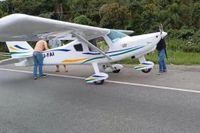A small plane made an emergency landing on the BR-101 highway in Garuva, Santa Catarina, on Saturday, April 5, 2025, due to engine issues. The incident occurred around 11:50 AM, causing a partial blockage in the southbound lane at kilometer 15, which resulted in traffic jams stretching approximately two kilometers.
The monomotor aircraft, registered as PU-FAI, was carrying two individuals—a pilot and the owner—who had taken off from the Garuva aeroclube en route to Joinville. According to the Federal Highway Police (PRF), the emergency landing was necessitated by an engine failure that forced the pilot to land on the highway. Fortunately, there were no collisions with other vehicles, and both occupants emerged uninjured.
After landing, the plane was pushed off the highway to allow for the resumption of traffic. Mechanics are currently assessing the aircraft's condition. If it is deemed fit for flying, the PRF will temporarily close the highway to facilitate a takeoff. However, if the plane cannot fly, its wings will need to be removed, and it will be transported from the site using a specialized truck.
The incident quickly drew attention as forced landings on federal highways like the BR-101 are relatively rare occurrences. Reports from Arteris Litoral Sul, the concessionaire responsible for the highway’s administration, confirmed that the forced landing did not result in any injuries. Instead, the aircraft came to a stop on the shoulder of the road, and traffic remained normal aside from the congestion caused by the situation.
As of now, there is a traffic queue of about one kilometer in the area, attributed to the high volume of vehicles. Arteris Litoral Sul has deployed teams to the site to assist with the operation and ensure motorist safety. The situation is being closely monitored, with updates expected to follow as more information becomes available.
This incident highlights the importance of safety measures in aviation, particularly regarding the maintenance and operational readiness of aircraft. The pilot, identified as Mateus Renan Calado, 29 years old, and the owner, Valdemiro José Minella, 71, a mining entrepreneur from Joinville, reportedly followed proper emergency protocols during the incident.
The aircraft involved, a Pelican 500 BR, is typically used for agricultural spraying and is certified for airworthiness under normal conditions, albeit under an experimental regime due to its modifications for specific uses.
As mechanics continue to evaluate the aircraft, the PRF remains on standby to manage the highway's traffic flow and ensure the safety of all road users. The coordination between aviation authorities and highway management is crucial in situations like this, where the safety of both air and road traffic must be balanced.
In summary, while the emergency landing created some temporary disruption on the BR-101, the absence of injuries and the swift response from authorities ensured that the situation was handled effectively. The ongoing assessment of the aircraft will determine the next steps, whether that involves a return to the skies or the logistical challenge of safely removing the plane from the highway.








